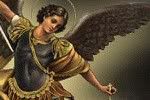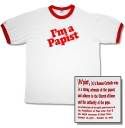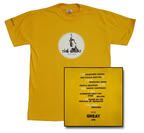Saint Francis of Assisi - A Heart Like My Own
Saint Francis of Assisi was born at Assisi in Umbria in either 1881 or 1882 (the exact year is uncertain). He was born into a wealthy family - his father, Pietro Bernadone, was a wealthy cloth merchant and his mother, Pica, is said to have belonged to a noble family of Provence. He was baptized with the name Giovanni but his father renamed him Francesco afterwards. It is probable that this was due to a great love of France.
Francis received a good education while he was young but seemed to have no interest in following in the footsteps of his father. It is said that Francis lived a very lavish youth, his parents indulging his every whim. He was very much in to the ways of the world and was all about pleasure. He was a 'favourite among the young nobles of Assisi'. 'But even at this time Francis showed an instinctive sympathy with the poor, and though he spent money lavishly, it still flowed in such channels as to attest a princely magnanimity of spirit.' It was a small glimmer of what was to come - but no one would have seen it coming.
When Francis was about twenty he went off to fight and was captured and held prisoner in Perugia for more than a year. While there Francis 'contracted a low fever' and very quickly decided to leave his lavish life behind. He decided to make a career out of the military and things would seem to be in his favor. 'His biographers tell us that the night before Francis set forth he had a strange dream, in which he saw a vast hall hung with armour all marked with the Cross. "These", said a voice, "are for you and your soldiers." "I know I shall be a great prince", exclaimed Francis exultingly, as he started for Apulia.' Shortly after, he was stopped in his journey again by illness. He had another dream, this time telling him to turn and go back to Assisi. He did. (This was in 1205.)
When back in Assisi, Francis did not cut off ties with his old comrades though it would be obvious that he was no longer willing to live their lifestyle. When they asked him if he were to be married, he said, "Yes, I am about to take a wife of surpassing fairness." It was around this time that Francis began to pray diligently for his call. He had laid aside his old ways and wanted very much to do what the Lord wished of him. Kneeling in the chapel of Saint Damian, located just below the town, in front of an ancient crucifix, Francis heard a voice call to him, "Go, Francis, and repair my house, which as you see is falling into ruin." Francis took this literally and gathered together materials to rebuild Saint Damian's.
The priest who presided over the little chapel there would not have it and after upsetting his father, Francis ran away and hid himself in a small cave near the chapel for over a month. When he came out again he was mocked by the town. His father took him home, beat him, bound him, and locked him a dark closet. One day, during Bernadone's absence, Francis's mother set him free and he returned to Saint Damian's, finding refuge there with the priest.
At this time Bernadone was so infuriated with Francis that he sought to force him to forego his inheritance. Francis was not arguing. He declared that he had entered the service of God and was no longer under civil authority. He stripped there of all of his garments - yes, down to his birth suit - and said to his father, "Hitherto I have called you my father on earth; henceforth I desire to say only 'Our Father who art in Heaven.'" At this point he wandered off into the hills merrily and ended up a scullion at a monastery for a short while. When he returned to the city he went around begging for stones to rebuild the church. (Little 'c', y'all.) He did rebuild the church, and two more after it. The first was St. Peter's and the second St. Mary of the Angels at a spot called the Porziuncola. (That's important for later. Remember that.)
'On a certain morning in 1208, probably 24 February, Francis was hearing Mass in the chapel of St. Mary of the Angels, near which he had then built himself a hut; the Gospel of the day told how the disciples of Christ were to possess neither gold nor silver, nor scrip for their journey, nor two coats, nor shoes, nor a staff, and that they were to exhort sinners to repentance and announce the Kingdom of God. Francis took these words as if spoken directly to himself, and so soon as Mass was over threw away the poor fragment left him of the world's goods, his shoes, cloak, pilgrim staff, and empty wallet.' He went forth from there in a harsh woolen tunic tied around him by knotted rope. He did exactly as the gospel had said, traveling the area 'exhorting the people of the country-side to penance, brotherly love, and peace'.
'In true spirit of religious enthusiasm, Francis repaired to the church of St. Nicholas and sought to learn God's will in their regard by thrice opening at random the book of the Gospels on the altar. Each time it opened at passages where Christ told His disciples to leave all things and follow Him. "This shall be our rule of life", exclaimed Francis, and led his companions to the public square, where they forthwith gave away all their belongings to the poor. After this they procured rough habits like that of Francis, and built themselves small huts near his at the Porziuncola.' When he had eleven followers Francis decided to write a rule for them.
'This first rule, as it is called, of the Friars Minor has not come down to us in its original form, but it appears to have been very short and simple, a mere adaptation of the Gospel precepts already selected by Francis for the guidance of his first companions, and which he desired to practice in all their perfection. When this rule was ready the Penitents of Assisi, as Francis and his followers styled themselves, set out for Rome to seek the approval of the Holy See, although as yet no such approbation was obligatory. There are differing accounts of Francis's reception by Innocent III. It seems, however, that Guido, Bishop of Assisi, who was then in Rome, commended Francis to Cardinal John of St. Paul, and that at the instance of the latter, the pope recalled the saint whose first overtures he had, as it appears, somewhat rudely rejected. Moreover, in site of the sinister predictions of others in the Sacred College, who regarded the mode of life proposed by Francis as unsafe and impracticable, Innocent, moved it is said by a dream in which he beheld the Poor Man of Assisi upholding the tottering Lateran, gave a verbal sanction to the rule submitted by Francis and granted the saint and his companions leave to preach repentance everywhere. Before leaving Rome they all received the ecclesiastical tonsure, Francis himself being ordained deacon later on.'
After returning to Assisi the followers of Francis would be called the Friars Minor. They were given the little chapel of St. Mary of the Angels and built with earthen materials their cells around it. It was here that the Franciscan Order was established - from very humble beginnings and very noble intentions.
'During the Lent of 1212, a new joy, great as it was unexpected, came to Francis. Clare, a young heiress of Assisi, moved by the saint's preaching at the church of St. George, sought him out, and begged to be allowed to embrace the new manner of life he had founded. By his advice, Clare, who was then but eighteen, secretly left her father's house on the night following Palm Sunday, and with two companions went to the Porziuncola, where the friars met her in procession, carrying lighted torches. Then Francis, having cut off her hair, clothed her in the Minorite habit and thus received her to a life of poverty, penance, and seclusion. Clare stayed provisionally with some Benedictine nuns near Assisi, until Francis could provide a suitable retreat for her, and for St. Agnes, her sister, and the other pious maidens who had joined her. He eventually established them at St. Damian's, in a dwelling adjoining the chapel he had rebuilt with his own hands, which was now given to the saint by the Benedictines as domicile for his spiritual daughters, and which thus became the first monastery of the Second Franciscan Order of Poor Ladies, now known as Poor Clares.'
Much can be read about Francis's order after this point in books and online (try this article from New Advent which has been quoted regularly in this entry) but as this is getting quite long, I will mention only interesting and important facts from here on out.
'It was during Christmastide of this year (1223) that the saint conceived the idea of celebrating the Nativity "in a new manner", by reproducing in a church at Greccio the praesepio of Bethlehem, and he has thus come to be regarded as having inaugurated the popular devotion of the Crib. Christmas appears indeed to have been the favourite feast of Francis, and he wished to persuade the emperor to make a special law that men should then provide well for the birds and the beasts, as well as for the poor, so that all might have occasion to rejoice in the Lord.' So Francis is said to have been responsible for the little scenes of the nativity we now put up in our homes and churches.
'Early in August, 1224, Francis retired with three companions to "that rugged rock 'twixt Tiber and Arno", as Dante called La Verna, there to keep a forty days fast in preparation for Michaelmas. During this retreat the sufferings of Christ became more than ever the burden of his meditations; into few souls, perhaps, had the full meaning of the Passion so deeply entered. It was on or about the feast of the Exaltation of the Cross (14 September) while praying on the mountainside, that he beheld the marvellous vision of the seraph, as a sequel of which there appeared on his body the visible marks of the five wounds of the Crucified which, says an early writer, had long since been impressed upon his heart. Brother Leo, who was with St. Francis when he received the stigmata, has left us in his note to the saint's autograph blessing, preserved at Assisi, a clear and simple account of the miracle, which for the rest is better attested than many another historical fact. The saint's right side is described as bearing on open wound which looked as if made by a lance, while through his hands and feet were black nails of flesh, the points of which were bent backward. After the reception of the stigmata, Francis suffered increasing pains throughout his frail body, already broken by continual mortification. For, condescending as the saint always was to the weaknesses of others, he was ever so unsparing towards himself that at the last he felt constrained to ask pardon of "Brother Ass", as he called his body, for having treated it so harshly. Worn out, moreover, as Francis now was by eighteen years of unremitting toil, his strength gave way completely, and at times his eyesight so far failed him that he was almost wholly blind.'
'During an access of anguish, Francis paid a last visit to St. Clare at St. Damian's, and it was in a little hut of reeds, made for him in the garden there, that the saint composed that "Canticle of the Sun", in which his poetic genius expands itself so gloriously. This was in September, 1225. Not long afterwards Francis, at the urgent instance of Brother Elias, underwent an unsuccessful operation for the eyes, at Rieti. He seems to have passed the winter 1225-26 at Siena, whither he had been taken for further medical treatment. In April, 1226, during an interval of improvement, Francis was moved to Cortona, and it is believed to have been while resting at the hermitage of the Celle there, that the saint dictated his testament, which he describes as a "reminder, a warning, and an exhortation". In this touching document Francis, writing from the fullness of his heart, urges anew with the simple eloquence, the few, but clearly defined, principles that were to guide his followers, implicit obedience to superiors as holding the place of God, literal observance of the rule "without gloss", especially as regards poverty, and the duty of manual labor, being solemnly enjoined on all the friars.'
As he approached death, Francis was escorted back to Assisi, though in quite a long trip as compared to the roads that could have been taken. They carried him the long way though due to fear of the Perugians taking him into their city for him to die - which would mean they would then obtain possession of his coveted relics.
'On the eve of his death, the saint, in imitation of his Divine Master, had bread brought to him and broken. This he distributed among those present, blessing Bernard of Quintaville, his first companion, Elias, his vicar, and all the others in order. "I have done my part," he said next, "may Christ teach you to do yours." Then wishing to give a last token of detachment and to show he no longer had anything in common with the world, Francis removed his poor habit and lay down on the bare ground, covered with a borrowed cloth, rejoicing that he was able to keep faith with his Lady Poverty to the end. After a while he asked to have read to him the Passion according to St. John, and then in faltering tones he himself intoned Psalm 141. At the concluding verse, "Bring my soul out of prison", Francis was led away from earth by "Sister Death", in whose praise he had shortly before added a new strophe to his "Canticle of the Sun". It was Saturday evening, 3 October, 1226, Francis being then in the forty-fifth year of his age, and the twentieth from his perfect conversion to Christ.'
Francis was canonized at St. George's by Gregory IX, 16 July, 1228. His feast is kept throughout the Church on 4 October, and the impression of the stigmata on his body is celebrated on 17 September.
A beautiful reflection on Saint Francis is found at the end of the same New Advent article which I have taken to quoting above.
Francis received a good education while he was young but seemed to have no interest in following in the footsteps of his father. It is said that Francis lived a very lavish youth, his parents indulging his every whim. He was very much in to the ways of the world and was all about pleasure. He was a 'favourite among the young nobles of Assisi'. 'But even at this time Francis showed an instinctive sympathy with the poor, and though he spent money lavishly, it still flowed in such channels as to attest a princely magnanimity of spirit.' It was a small glimmer of what was to come - but no one would have seen it coming.
When Francis was about twenty he went off to fight and was captured and held prisoner in Perugia for more than a year. While there Francis 'contracted a low fever' and very quickly decided to leave his lavish life behind. He decided to make a career out of the military and things would seem to be in his favor. 'His biographers tell us that the night before Francis set forth he had a strange dream, in which he saw a vast hall hung with armour all marked with the Cross. "These", said a voice, "are for you and your soldiers." "I know I shall be a great prince", exclaimed Francis exultingly, as he started for Apulia.' Shortly after, he was stopped in his journey again by illness. He had another dream, this time telling him to turn and go back to Assisi. He did. (This was in 1205.)
When back in Assisi, Francis did not cut off ties with his old comrades though it would be obvious that he was no longer willing to live their lifestyle. When they asked him if he were to be married, he said, "Yes, I am about to take a wife of surpassing fairness." It was around this time that Francis began to pray diligently for his call. He had laid aside his old ways and wanted very much to do what the Lord wished of him. Kneeling in the chapel of Saint Damian, located just below the town, in front of an ancient crucifix, Francis heard a voice call to him, "Go, Francis, and repair my house, which as you see is falling into ruin." Francis took this literally and gathered together materials to rebuild Saint Damian's.
The priest who presided over the little chapel there would not have it and after upsetting his father, Francis ran away and hid himself in a small cave near the chapel for over a month. When he came out again he was mocked by the town. His father took him home, beat him, bound him, and locked him a dark closet. One day, during Bernadone's absence, Francis's mother set him free and he returned to Saint Damian's, finding refuge there with the priest.
At this time Bernadone was so infuriated with Francis that he sought to force him to forego his inheritance. Francis was not arguing. He declared that he had entered the service of God and was no longer under civil authority. He stripped there of all of his garments - yes, down to his birth suit - and said to his father, "Hitherto I have called you my father on earth; henceforth I desire to say only 'Our Father who art in Heaven.'" At this point he wandered off into the hills merrily and ended up a scullion at a monastery for a short while. When he returned to the city he went around begging for stones to rebuild the church. (Little 'c', y'all.) He did rebuild the church, and two more after it. The first was St. Peter's and the second St. Mary of the Angels at a spot called the Porziuncola. (That's important for later. Remember that.)
'On a certain morning in 1208, probably 24 February, Francis was hearing Mass in the chapel of St. Mary of the Angels, near which he had then built himself a hut; the Gospel of the day told how the disciples of Christ were to possess neither gold nor silver, nor scrip for their journey, nor two coats, nor shoes, nor a staff, and that they were to exhort sinners to repentance and announce the Kingdom of God. Francis took these words as if spoken directly to himself, and so soon as Mass was over threw away the poor fragment left him of the world's goods, his shoes, cloak, pilgrim staff, and empty wallet.' He went forth from there in a harsh woolen tunic tied around him by knotted rope. He did exactly as the gospel had said, traveling the area 'exhorting the people of the country-side to penance, brotherly love, and peace'.
'In true spirit of religious enthusiasm, Francis repaired to the church of St. Nicholas and sought to learn God's will in their regard by thrice opening at random the book of the Gospels on the altar. Each time it opened at passages where Christ told His disciples to leave all things and follow Him. "This shall be our rule of life", exclaimed Francis, and led his companions to the public square, where they forthwith gave away all their belongings to the poor. After this they procured rough habits like that of Francis, and built themselves small huts near his at the Porziuncola.' When he had eleven followers Francis decided to write a rule for them.
'This first rule, as it is called, of the Friars Minor has not come down to us in its original form, but it appears to have been very short and simple, a mere adaptation of the Gospel precepts already selected by Francis for the guidance of his first companions, and which he desired to practice in all their perfection. When this rule was ready the Penitents of Assisi, as Francis and his followers styled themselves, set out for Rome to seek the approval of the Holy See, although as yet no such approbation was obligatory. There are differing accounts of Francis's reception by Innocent III. It seems, however, that Guido, Bishop of Assisi, who was then in Rome, commended Francis to Cardinal John of St. Paul, and that at the instance of the latter, the pope recalled the saint whose first overtures he had, as it appears, somewhat rudely rejected. Moreover, in site of the sinister predictions of others in the Sacred College, who regarded the mode of life proposed by Francis as unsafe and impracticable, Innocent, moved it is said by a dream in which he beheld the Poor Man of Assisi upholding the tottering Lateran, gave a verbal sanction to the rule submitted by Francis and granted the saint and his companions leave to preach repentance everywhere. Before leaving Rome they all received the ecclesiastical tonsure, Francis himself being ordained deacon later on.'
After returning to Assisi the followers of Francis would be called the Friars Minor. They were given the little chapel of St. Mary of the Angels and built with earthen materials their cells around it. It was here that the Franciscan Order was established - from very humble beginnings and very noble intentions.
'During the Lent of 1212, a new joy, great as it was unexpected, came to Francis. Clare, a young heiress of Assisi, moved by the saint's preaching at the church of St. George, sought him out, and begged to be allowed to embrace the new manner of life he had founded. By his advice, Clare, who was then but eighteen, secretly left her father's house on the night following Palm Sunday, and with two companions went to the Porziuncola, where the friars met her in procession, carrying lighted torches. Then Francis, having cut off her hair, clothed her in the Minorite habit and thus received her to a life of poverty, penance, and seclusion. Clare stayed provisionally with some Benedictine nuns near Assisi, until Francis could provide a suitable retreat for her, and for St. Agnes, her sister, and the other pious maidens who had joined her. He eventually established them at St. Damian's, in a dwelling adjoining the chapel he had rebuilt with his own hands, which was now given to the saint by the Benedictines as domicile for his spiritual daughters, and which thus became the first monastery of the Second Franciscan Order of Poor Ladies, now known as Poor Clares.'
Much can be read about Francis's order after this point in books and online (try this article from New Advent which has been quoted regularly in this entry) but as this is getting quite long, I will mention only interesting and important facts from here on out.
'It was during Christmastide of this year (1223) that the saint conceived the idea of celebrating the Nativity "in a new manner", by reproducing in a church at Greccio the praesepio of Bethlehem, and he has thus come to be regarded as having inaugurated the popular devotion of the Crib. Christmas appears indeed to have been the favourite feast of Francis, and he wished to persuade the emperor to make a special law that men should then provide well for the birds and the beasts, as well as for the poor, so that all might have occasion to rejoice in the Lord.' So Francis is said to have been responsible for the little scenes of the nativity we now put up in our homes and churches.
'Early in August, 1224, Francis retired with three companions to "that rugged rock 'twixt Tiber and Arno", as Dante called La Verna, there to keep a forty days fast in preparation for Michaelmas. During this retreat the sufferings of Christ became more than ever the burden of his meditations; into few souls, perhaps, had the full meaning of the Passion so deeply entered. It was on or about the feast of the Exaltation of the Cross (14 September) while praying on the mountainside, that he beheld the marvellous vision of the seraph, as a sequel of which there appeared on his body the visible marks of the five wounds of the Crucified which, says an early writer, had long since been impressed upon his heart. Brother Leo, who was with St. Francis when he received the stigmata, has left us in his note to the saint's autograph blessing, preserved at Assisi, a clear and simple account of the miracle, which for the rest is better attested than many another historical fact. The saint's right side is described as bearing on open wound which looked as if made by a lance, while through his hands and feet were black nails of flesh, the points of which were bent backward. After the reception of the stigmata, Francis suffered increasing pains throughout his frail body, already broken by continual mortification. For, condescending as the saint always was to the weaknesses of others, he was ever so unsparing towards himself that at the last he felt constrained to ask pardon of "Brother Ass", as he called his body, for having treated it so harshly. Worn out, moreover, as Francis now was by eighteen years of unremitting toil, his strength gave way completely, and at times his eyesight so far failed him that he was almost wholly blind.'
'During an access of anguish, Francis paid a last visit to St. Clare at St. Damian's, and it was in a little hut of reeds, made for him in the garden there, that the saint composed that "Canticle of the Sun", in which his poetic genius expands itself so gloriously. This was in September, 1225. Not long afterwards Francis, at the urgent instance of Brother Elias, underwent an unsuccessful operation for the eyes, at Rieti. He seems to have passed the winter 1225-26 at Siena, whither he had been taken for further medical treatment. In April, 1226, during an interval of improvement, Francis was moved to Cortona, and it is believed to have been while resting at the hermitage of the Celle there, that the saint dictated his testament, which he describes as a "reminder, a warning, and an exhortation". In this touching document Francis, writing from the fullness of his heart, urges anew with the simple eloquence, the few, but clearly defined, principles that were to guide his followers, implicit obedience to superiors as holding the place of God, literal observance of the rule "without gloss", especially as regards poverty, and the duty of manual labor, being solemnly enjoined on all the friars.'
As he approached death, Francis was escorted back to Assisi, though in quite a long trip as compared to the roads that could have been taken. They carried him the long way though due to fear of the Perugians taking him into their city for him to die - which would mean they would then obtain possession of his coveted relics.
'On the eve of his death, the saint, in imitation of his Divine Master, had bread brought to him and broken. This he distributed among those present, blessing Bernard of Quintaville, his first companion, Elias, his vicar, and all the others in order. "I have done my part," he said next, "may Christ teach you to do yours." Then wishing to give a last token of detachment and to show he no longer had anything in common with the world, Francis removed his poor habit and lay down on the bare ground, covered with a borrowed cloth, rejoicing that he was able to keep faith with his Lady Poverty to the end. After a while he asked to have read to him the Passion according to St. John, and then in faltering tones he himself intoned Psalm 141. At the concluding verse, "Bring my soul out of prison", Francis was led away from earth by "Sister Death", in whose praise he had shortly before added a new strophe to his "Canticle of the Sun". It was Saturday evening, 3 October, 1226, Francis being then in the forty-fifth year of his age, and the twentieth from his perfect conversion to Christ.'
Francis was canonized at St. George's by Gregory IX, 16 July, 1228. His feast is kept throughout the Church on 4 October, and the impression of the stigmata on his body is celebrated on 17 September.
A beautiful reflection on Saint Francis is found at the end of the same New Advent article which I have taken to quoting above.
Labels: Saints













0 Comments:
Post a Comment
<< Home